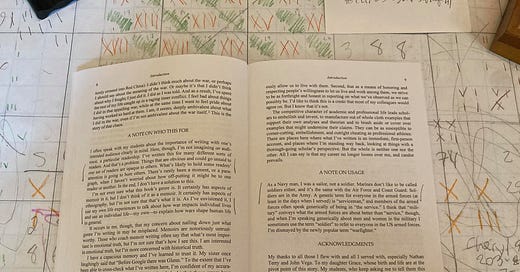“I often speak with my students about writing with one’s intended audience clearly in mind.”
Glenn Petersen researches and teaches as a university professor. He habitually passes to his students the common sense theorized by Stanley Fish, the plumber’s son who rose much higher advancing much less knowledge by keeping his eye on the prize.
“Here, though, I am not imagining *an* audience, a particular readership. I've written this for many kinds of readers.”
Glenn published his Traditional Micronesian Societies with Hawai'i University Press. That work presents the findings of hundreds of other university press books.
Whoever may use it, as I have for my own reasons, the author and each of his scholarly sources wrote for an audience of colleagues from whom an editor selected peers to review the manuscript.
"And that's a problem. Things that are obvious and could go unsaid to one set of readers are opaque to others. What's likely to hold some readers' attention is going to bore others."
So Glenn has published this second book of his life, in every sense, with Hamilton, who do not practice peer review. There are peers on the back of the book, the psychologist Glenn Albright, the anthropologist David Price, and the naval captain Matthew Testerman,
who recommend the work in plain terms specifying what value each found, without effusing in fulsomeness as is customary on a university press book. I buy books like this, myself, while I remain thrilled only to borrow the peer-reviewed ones from our research library.
I would have bought this one but I broke a rule to accept it as a gift from the author because I had written about the first one - don't miss it - and already had planned to write about it again. Glenn has got my attention for life: will his new book win yours?
"I'm not even sure what this book's genre is. It certainly has aspects of memoir in it, but I don't think of it as a memoir. It certainly has aspects of ethnography, but I'm not sure what that is. As I've envisioned it, I use my own life experiences to talk about how war impacts individual lives and use an individual life - my own - to explain how wars shape human life in general."
Glenn was a teenage sailor with more than 70 missions over the Democratic Republic of Viet Nam before he finished high school. He became one of those anthropologists who really do what the public thinks we do,
making many long visits to a Pacific island, joining with the small community there to grasp the ways of a people who settle the most vast expanse of our planet. He has gone to work for them in an exemplary manner, assisting as they all have joined together to represent themselves in world councils on what has become a gripping issue for all humanity, life on the shore.
Now Superman has returned to his origin story, facing the Kryptonite. I am reading it in small bites to chew over for a long time. He keeps saying these things that I often tell people, in my own role as ethnographer of men like Glenn, the crazy bright and as-yet indifferently educated youths our armed forces have sent out to accomplish complicated tasks no one understands.
For instance,
"As a Navy man, I was a sailor, not a soldier. Marines don't like to be called soldiers either, and it's the the same with the Air Force and the Coast Guard. Soldiers are in the Army."
Now if he had told his story in 1978 when I was 18 I could have done something else. Math, I think. But he didn't, that is what the story is about, so I encourage you to join me for a few years of reading Glenn.
Viet Nam letters has addressed War and the Arc of Human Experience by Glenn Petersen 7 times so far. The first posted on February 19, 2022 and the second on March 7, 2022.
Then the fourth came on April 27, 2022, fifth on May 30, 2022, sixth on July 11, 2022, and seventh on June 20, 2023.
Viet Nam letters respects the property of others under paragraph 107 of United States Code Title 17. If we asked for permission it wouldn’t be criticism. We explain our fair use at length in the letter of September 12, 2022.
The colophon of these Viet Nam letters, directly above, shows the janitor speaking with poet David A. Willson on a Veterans Day.







I will definitely buy this book!
Thanks!